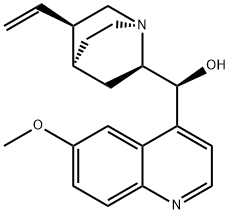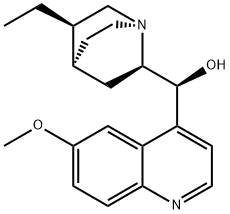Quinidine , ≥98.0%(including 5-15%dihydroquinidine) , 56-54-2
CAS NO.:56-54-2
Empirical Formula: C20H24N2O2
Molecular Weight: 324.42
MDL number: MFCD00135581
EINECS: 200-279-0
| Pack Size | Price | Stock | Quantity |
| 1G | RMB52.00 | In Stock |
|
| 5G | RMB79.20 | In Stock |
|
| 25G | RMB256.80 | In Stock |
|
| 100G | RMB676.80 | In Stock |
|
| others | Enquire |
PRODUCT Properties
| Melting point: | 168-172 °C(lit.) |
| Boiling point: | 462.75°C (rough estimate) |
| alpha | 256 º (c=1, EtOH) |
| Density | 1.1294 (rough estimate) |
| refractive index | 1.5700 (estimate) |
| storage temp. | Keep in dark place,Sealed in dry,2-8°C |
| solubility | insoluble in H2O; ≥10.32 mg/mL in EtOH with ultrasonic; ≥11.95 mg/mL in DMSO |
| form | Powder |
| pka | 5.4, 10.0(at 20℃) |
| color | White to off-white |
| optical activity | [α]20/D +265±5°, c = 0.8% in ethanol (dry matter) |
| Water Solubility | 0.05 g/100 mL (20 ºC) |
| Sensitive | Light Sensitive |
| Merck | 14,8060 |
| BRN | 91866 |
| BCS Class | 1 |
| Stability: | Stable. Incompatible with strong oxidizing agents. |
| LogP | 3.440 |
| CAS DataBase Reference | 56-54-2(CAS DataBase Reference) |
| NIST Chemistry Reference | Quinine(56-54-2) |
| EPA Substance Registry System | Quinidine (56-54-2) |
Description and Uses
Quinidine is a stereoisomer of the antimalarial agent quinine and a class Ia antiarrhythmic agent. Quinidine blocks the voltage-gated sodium (Nav) channel Nav1.5 in a use-dependent manner. It decreases the amplitude and duration of action potentials in isolated canine ventricular myocytes. It inhibits KKr, peak INa, and late INa (IC50s = 4.5, 11, and 12 μM, respectively) and can induce torsade de pointes in isolated rabbit hearts when used at a concentration of 1 μM. Quinidine induces QT prolongation in dogs. It also binds to M2 muscarinic acetylcholine receptors (Ki = 7.5 μM for human recombinant receptors expressed in HM2-B10 cells). Formulations containing quinidine have been used in the treatment of atrial fibrillation and ventricular arrhythmias.
antiarrhythmic, antimalarial
Safety
| Symbol(GHS) |  GHS06 |
| Signal word | Danger |
| Hazard statements | H301-H317 |
| Precautionary statements | P261-P264-P270-P280-P301+P310-P302+P352 |
| Hazard Codes | Xn |
| Risk Statements | 22-20/21/22 |
| Safety Statements | 36-22 |
| RIDADR | UN 2811 6.1/PG 3 |
| WGK Germany | 3 |
| RTECS | VA4725000 |
| F | 8 |
| TSCA | Yes |
| HazardClass | 6.1(b) |
| PackingGroup | III |
| HS Code | 29392000 |
| Hazardous Substances Data | 56-54-2(Hazardous Substances Data) |
| Toxicity | LD50 in rats (mg/kg): 30 i.v., 263 orally (Dietmann) |




